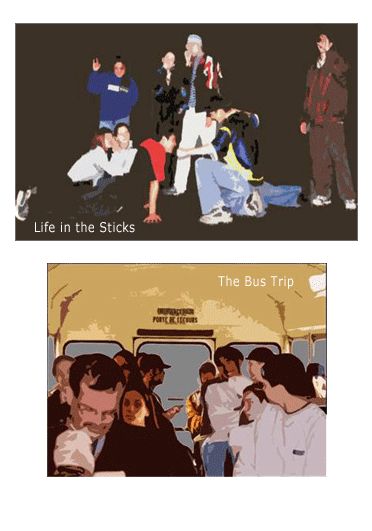
“Life in the Sticks,” was the title of a Popular Theatre project facilitated with a group of high school drama students in a rural Alberta community of majority Aboriginal population. Popular Theatre, a process of theatre for personal and social change, became the participatory, performative research method employed. It was the medium through which students portrayed and examined incidents from their lives, investigating their perceptions of their experiences.
Our drama explorations raised issues that students identified as relevant. “Life in the Sticks,” was based on their initial claim that their issues were determined by their rural environment. These issues included rule breaking, substance use, risky sex and interpersonal conflict. As they said, “Kids get into all kinds of trouble because they are bored.” Our work helped them re-examine some of their beliefs. Ultimately, they claimed their risky behaviour was a matter of personal choice and habit. This attitude had the potential to be empowering, giving them back a sense of agency and control over their lives, but left me wondering what motivated their risky choices.
Students’ perceptions helped me reframe the label “at-risk.” Used in mainstream literature in education, health care and criminal justice, the label portrays youth, their families and communities as deficient or deviant if they do not conform to society’s expectations. The reinterpretation, based on our drama work, highlights youths’ agency in choosing to engage in risky behaviour, and the enjoyment they gain from it. Explored are the risky or resistant qualities of youth behaviour as performative acts with subversive potential to critique schooling practices and undermine unjust social relations. The interpretation includes an autoethnographic inquiry – a collection of artifacts from the researcher’s youth and the risky stories they elicit.
This study advocates the beliefs and practices of Popular Theatre as an empowering pedagogy for youth and an effective research method. It offers a counter-narrative that interrupts taken-for-granted understandings of youth behaviour to present a more complex picture than one of deviance and deficiency, towards an understanding of youth and risk that more fully reflects their realities and better responds to their needs.
Conrad, D. (2006). Entangled in the sticks: Ethical conundrums of popular theatre as pedagogy and research. Qualitative Inquiry, 12(3), 437-458.
Available: http://qix.sagepub.com/content/12/3.toc
Conrad, D. (2005). Rethinking “at-risk” in drama education: Beyond prescribed roles. Research in Drama Education, 10(1), 27-41.
Available: http://www.tandfonline.com/doi/abs/10.1080/13569780500053114
Conrad, D. (2004). “Life in the sticks”: Youth, risk & popular theatre process. Unpublished doctoral dissertation, University of Alberta, Edmonton, AB.
Conrad, D. (2004). Exploring risky youth experiences: Popular theatre as a participatory, performative research method. International Journal of Qualitative Methods, 3(1) [Online]
Available: http://www.ualberta.ca/~iiqm/backissues/3_1/pdf/conrad.pdf
Conrad, D. (2004). When autobiography and research topics collide: Two risky school dance stories. Taboo: The Journal of Culture and Education, 8(1), 85-95.
Available: http://www.eric.ed.gov/PDFS/EJ795528.pdf
Conrad, D. (2004). Popular theatre: Empowering pedagogy for youth. Youth Theatre Journal, (18), 87-106.
Available: http://www.tandfonline.com/doi/pdf/10.1080/08929092.2004.10012566